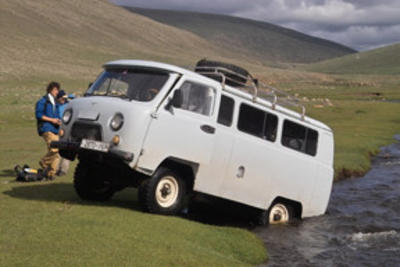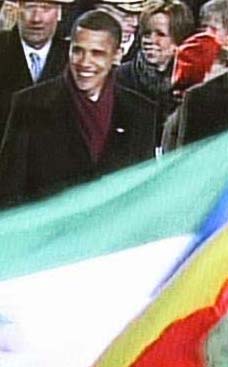
"Finding a ride is usually pretty hard because drivers won't go somewhere unless they have enough people to take, so going straight from my site to UB is not always the best option. I normally have to go to the main center in my aimag (essentially my state capital) to catch a daily bus. So, my first job is to find a ride to the aimag center which is about an hour and a half ride. This ride is usually in a Russian-made van that most of the drivers in the country drive. They can fit around 10 or 12 people comfortably, however, I have come to find that the word comfortable does not exist in the Mongolian language. Packing five or six people over the limit into a vehicle is normal, but I was recently part of an experiment that tested even that limit."
PCV Brett Cambell writes: Because few roads exist in Mongolia, the majority of my travels are spent on trails that drivers have made in the desert
Likin' my ride
Thursday, January 29, 2009
Travel in Mongolia a unique experience
Caption: Whoops! Traveling in Mongolia, whether it be through the Gobi Desert or the mountains, can be hazardous. With most residents without vehicles, and undeveloped roadways, travel to the Capitol City of Ulaanbaatar often features Russian-made passenger vans overloaded with people and baggage.
Mongolia is a large country. As I mentioned in a previous article, if you placed Mongolia on top of the United States it would reach from Denver to New York. A country this large means travel is going to be a little tricky (and it is).
As Peace Corps Volunteers we are spread throughout the country. There are volunteers in the western-most part of the country (Denver) and there are also volunteers in the eastern-most part of the country (they don't quite live in New York; we will say Ohio). Our Peace Corps headquarters is in the middle of the country in the capital of Mongolia which is called Ulaanbaatar (maybe equal to Chicago?).
If we ever have Peace Corps trainings or if a person has to fly somewhere, Ulaanbaatar is the place to be (it is the central hub of the country and our Peace Corps life). So, with the distance, and then adding the rough terrain and no roads, travel can be long and arduous.
Because no roads exist, the majority of my travels are spent on trails that drivers have made in the desert. They are bumpy and winding and not comfortable at all. As a passenger you have to stay on your guard at all times. If you don't and you hit a large bump, a concussion, or a broken neck will be the result as your head hits the ceiling of the vehicle. On that note, one of the most amazing things I have ever seen is a Mongolian sleeping on one of these rides. Their heads are bouncing all over the place, but their eyes stay shut (that is until their head hits the window, but you can't blame them for that).
Now, I will explain a trip from my site to the capital. I live just south of UB in the Gobi Desert. From my site a trip will range from six to nine hours. A six-hour trip would mean I am riding with someone who owns a nice SUV (my ger owner for instance) and they are going to UB the same day I am. A nine-hour drive is usually due to flat tires, stopping for buuz (meat dumplings), and car sickness.
Finding a ride is usually pretty hard because drivers won't go somewhere unless they have enough people to take, so going straight from my site to UB is not always the best option. I normally have to go to the main center in my aimag (essentially my state capital) to catch a daily bus. So, my first job is to find a ride to the aimag center which is about an hour and a half ride. This ride is usually in a Russian-made van that most of the drivers in the country drive. They can fit around 10 or 12 people comfortably, however, I have come to find that the word comfortable does not exist in the Mongolian language. Packing five or six people over the limit into a vehicle is normal, but I was recently part of an experiment that tested even that limit.
When the driver picked me up he opened the driver's side door and told me to get in. Odd, but I did and it wasn't until I got all the way in that I realized I would be sitting right next to the driver with the stick shift between my legs. In these vans the engine is between the driver and the front passenger's seats so it is raised up in that area, and that's where I was sitting with my head at a constant tilt due to the ceiling and a metal rod digging into my back.
A little girl was sitting next to me (looking comfortable as ever) on the engine and her mother and baby brother were sitting in the passenger seat. At that point I knew it wasn't going to be a comfortable ride for me, but then I looked in the back. I have never seen so many people in a single space before. I tried to count the people but there were too many to even count. There had to have been close to 30 people in this van that was made to fit 10 comfortably. The best way I could possibly describe this trip is by saying, "Worst ride ever" (that one's for you Simpson's fans).
(Photo)
After arriving in the aimag center and getting over the permanent damage I had just done to my spine, I had to take a seven-hour bus ride to get to UB. The buses only leave in the morning so I stay with a friend and then wake up and leave the next morning. The buses usually aren't much better than the vans when it comes to the amount of people they pack in. They only sell so many tickets, but after everyone with a ticket is on they are glad to let other people pay for a spot in the aisle as long as it's not filled with bags. The last bus ride I was on, the aisle was filled with bags, about three feet high. There were also way too many people so I was sitting in a two-person seat between two cute college-aged girls (this time I wasn't complaining).
In Mongolia people are not shy when it comes to personal space. When my friend at school sits next to me to talk he will usually put his hand on my leg. This was a little uncomfortable at first, but it was something I had to get used to because everyone does it. The American sense of personal space does not exist here, and this bus ride proved it.
I had my arms behind the two girls so I could breath (I know, oldest trick in the book). As we were driving along, the girl to my left decided that my chest looked like a good place to lay her head, so she did, and fell asleep. Well, the other girl then started to get sleepy and I was the only pillow she could find so she too laid her head on my chest. I haven't lifted weights for a while so I'm going to be honest and say that my chest isn't as big as it used to be, so since there wasn't enough room for two girls heads on my chest, the first girl decided to lay her head in my lap, and she did and fell asleep again. As I said before though, this is normal. If you looked around that bus you would see every Mongolian sleeping on someone else, that's just how things work here.
After arriving in UB after a seven-hour bus ride, a ride on a city bus is in order. Buses in the city use the same game plan as every other vehicle in the country. Shove in as many people on as you can.
A bus will stop for about 10 seconds. In this amount of time people who need to get off do, and people who need to get on do (if you're too slow, too bad). If you succeed in getting on the bus, you are immediately pushed into a sea of people. There is literally no room to move. Just imagine being crushed against the front barrier by all the people behind you at, lets say a Beatles concert for the older generations reading this, and maybe a Green Day concert for you kids (Kids: I'm going to be honest, I'm not as hip as I used to be. Is Green Day still popular? "Older Generations:" So I don't offend anyone, I would much rather be at the Beatles concert) and that is a Mongolian city bus ride. When you want to get off you have to push and elbow your way to a door and rush off in that little amount of time you have. To say the least, it's an experience.
So travel in Mongolia is a trip (lame, I know, but I couldn't resist). Every time you get into a vehicle anything is possible. My travel experiences have been interesting and I only live eight hours away from UB. The people who live in the "Denver" part of Mongolia have around a two-day trip into the capital, and that's through mountains - terrain that is much harsher than my flat bumpy desert. So, I obviously can't complain.
And finally. I was recently back in the states for a little while and I rode in a car with a seat all to myself and a paved highway and a gas station every five miles, and that's when I realized that you (yes, you reading this) can't complain either.













